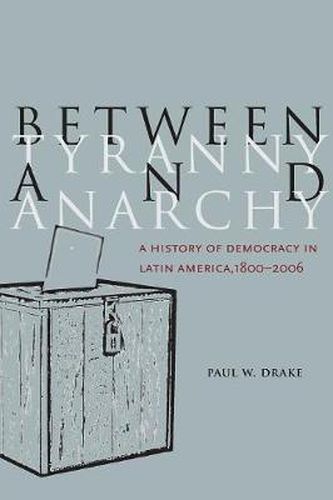Readings Newsletter
Become a Readings Member to make your shopping experience even easier.
Sign in or sign up for free!
You’re not far away from qualifying for FREE standard shipping within Australia
You’ve qualified for FREE standard shipping within Australia
The cart is loading…






Between Tyranny and Anarchy provides a unique comprehensive history and interpretation of efforts to establish democracies over two centuries in the major Latin American countries. Drake takes an unusual interdisciplinary approach, combining history and political science with an emphasis on political institutions. He argues that, without a thorough examination of the historical roots and causes of Latin American democracy, most general theories can not adequately explain its failures, successes, and forms.
Latin America offers an extraordinary laboratory for the study of democratic experiments. Alongside a well-deserved reputation for authoritarianism, it boasts one of the world’s deepest, richest histories of democratic movements, ideas, and institutions. Contrary to conventional wisdom, the region’s leading democracies did not lag very far behind the United States and Western Europe in making numerous advances. In comparison with those countries, though, Latin America’s democratic history has been distinctive because of its fundamental dilemma: how to reconcile political systems theoretically committed to legal equality with societies divided by extreme socio-economic inequalities.
$9.00 standard shipping within Australia
FREE standard shipping within Australia for orders over $100.00
Express & International shipping calculated at checkout
Between Tyranny and Anarchy provides a unique comprehensive history and interpretation of efforts to establish democracies over two centuries in the major Latin American countries. Drake takes an unusual interdisciplinary approach, combining history and political science with an emphasis on political institutions. He argues that, without a thorough examination of the historical roots and causes of Latin American democracy, most general theories can not adequately explain its failures, successes, and forms.
Latin America offers an extraordinary laboratory for the study of democratic experiments. Alongside a well-deserved reputation for authoritarianism, it boasts one of the world’s deepest, richest histories of democratic movements, ideas, and institutions. Contrary to conventional wisdom, the region’s leading democracies did not lag very far behind the United States and Western Europe in making numerous advances. In comparison with those countries, though, Latin America’s democratic history has been distinctive because of its fundamental dilemma: how to reconcile political systems theoretically committed to legal equality with societies divided by extreme socio-economic inequalities.